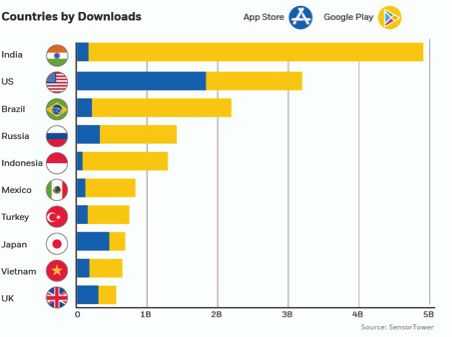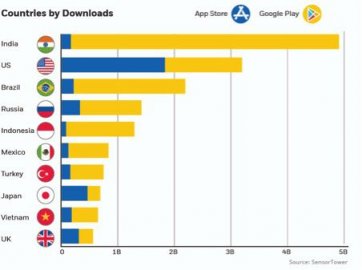Li Jun: For Chinese Internet companies, India is today's yesterday.Chinese technology companies have the opportunity to obtain the revelation of the development direction through the perspective of God.
Due to the deterioration of the relationship between the two countries caused by border friction, the Indian government announced that it had blocked 59 Internet applications from China, including Douyin's overseas version of TIKTOK, WeChat, Weibo, and Eggplant fast.At present, the Indian government has notified Google and Apple to remove these applications in the Android or Apple application market for India.Some application providers in China also received a notice from relevant Indian departments, asking them to take the initiative to get off the application market in India and close their services to the Indian market.
It is undeniable that when China and India have recently generated border friction, the Indian government's behavior of blocking the Chinese Internet application is to cater to the aggressive public opinion in China.But carefully sorting out the regulatory measures of the Indian government in the Internet and e -commerce fields in recent years, we will find that in addition to political reasons behind these blockade, we will actually have other considerations from the Indian government.
The most potential mobile Internet market
For a long time, the Chinese people's impression of India is poverty, backward, population, and polarization.The infrastructure construction of society is seriously insufficient, and it is still using the railway network left by the UK decades ago.
Compared with China's rapid development in the past thirty years, India has indeed fell behind China.But the popularity of the mobile Internet allowed India to stand on the threshold of the whole people into the Internet era for the first time.
India's emerging mobile operator Reliance Jio started from providing free 4G traffic in 2016. The data package of 149 rupees (about $ 2) a month after the free period has been promoting the rapid and low cost of Indian society to access the movement.internet.By September 2019, Reliance Jio already had nearly 360 million 4G users in India.The entire mobile 4G users also reached nearly 550 million.
In addition to very cheap mobile data packages, low -end smartphones of Chinese brands are also an important factor in accelerating the development of mobile Internet in India.In the end, most Indians with low income can afford the costs required for surfing the Internet.
With the significant increase in the number of Indian Internet users, the number of web page browsing, social network use, and video viewing is also increasing simultaneously.According to statistics from Sensor Tower, India is currently the country with the largest download volume of mobile phone applications in the world. In 2019, the total downloads of Apple and Android app stores were nearly 5 billion times, far exceeding 3 billion times ranking in the second United States.(Remarks: Since the Android app store is unavailable in mainland China, this statistics do not include China

The huge population, the young age structure and the low tariff, make India a mobile Internet market for the next 1 billion -level users.Faced with such unique mobile Internet gold mines, will the Indian government easily give up to overseas companies?The answer is probably no.
Set supervision rules to grasp the main control
China's regulatory means in the development of the Internet and mobile Internet industry have left a deep impression on the Indian government.Under the requirements of data security and other aspects of the Chinese regulatory authorities, some international Internet giants such as Google, Facebook and Twitter finally abandoned the Chinese market. Other Internet giants such as Apple and Amazon have built and built and cooperated in localized landing.Different operations and management models in the world have all created conditions objectively for local Internet service providers such as Baidu, Sina, and Ali, such as Baidu, Sina, and Ali.
Former Modi government economic adviser, Arvind Subramanian, the current lecturer of Harvard University, said: The Chinese model has been strongly recognized in India.India believes that China can build successful domestic companies, why not take the same practice?
In August 2018, Wal -Mart invested in the controlling shareholder Flipkart, the largest e -commerce company in India at a price of $ 16 billion, and both founders of Flipkart both left the company Binny Bansal and Sachin Bansal.The opponents followed in the Indian e -commerce market are Amazon, and the two account for nearly 2/3 of the market share.After the acquisition, American companies became the absolute leaders of the Indian e -commerce market.
In February 2019, the DEPARTMENT for Promotion of Industry and International Trade (DPIIT) announced that the government would formulate a draft policy for the rapidly developing e -commerce industry.The focus of the draft is the localization of data localization, improving privacy protection measures, and the combating measures to combat counterfeit products.
The draft clearly states that maintaining data control in order to create employment opportunities for India is essential.In other words, all Indian e -commerce companies must establish data centers locally in India, operate business processes locally, and eventually create employment for local.Behind the localization of data is that the Indian government expects the development of the Internet economy to be the greatest extent to be enjoyed by the country's economy, rather than the loss of overseas.
Under the explicit statement of the draft government regulatory rules, the Flipkart acquired by Amazon and Wal -Mart had to reorganize its Indian business in accordance with the requirements of the new policy draft.
In fact, this is not a trend of the Indian government.In 2018, the Central Bank of India requires financial service providers such as MasterCard and VISA (VISA) must store data from Indian users locally, and give the three -year period requesting all financial service providers to meet the government's compliance requirements.
After all, relying on a 1 billion -level user market to build the Internet industry that belongs to the country is too attractive, and neighboring countries in the east also give a demonstration. It is difficult for the Indian government to resist such temptation.Facing some Chinese Internet applications currently occupying the mainstream of India, it is also an important reason for India to use the opportunity to promote the rapid growth of Internet applications in the country with the opportunity to promote the rapid growth of Internet applications in the country.
It should be pointed out that the Indian government's goal is to establish legal and technical frameworks for the entire Internet industry to limit the cross -border flow of user data, not just for e -commerce platforms.In other words, social media companies such as GOOGLE and Facebook may eventually be required to store users and business data in India locally.All Internet companies are facing a challenge of how to successfully land in the Indian market.
As a result, Reliance Jio, the most successful mobile operator mentioned earlier, became the best channel for various overseas companies to get the development of the development dividends in the Indian Internet industry.In the first half of 2020, Reliance Jio received multiple investments such as Facebook, Vista Equity, Silver Lake, and its valuation rose to nearly $ 70 billion.The most worth mentioning is that Facebook acquired nearly 10%of Reliance Jio's shares at a price of $ 5.8 billion.Because Facebook's WhatsApp has 400 million Indian users.After being rejected by China, Facebook could not bear the cost of missing the Indian market anyway.Reliance Jio is the best partner of various services in Facebook in India.Amazon put his attention on another mobile operator Bharti Airtel. Currently, the media discloses Amazon's plan to invest 2 billion US dollars to acquire Bharti Airtel's shares.Google and Microsoft are moving with the third largest mobile transportationBusiness Vodafone Idea discusses investment cooperation.
China's opportunity
Although the Indian government is ambitious in developing its own Internet industry, the relatively poor population, backward infrastructure, lack of funds, overall education level and insufficient high -tech research and development capabilities, and the shortcomings of the government's social management capabilities will all will be.It seriously restricts India's possibility of creating a all -in -Internet industry that has been controlled by itself.Regardless of whether India is willing or not, overseas funds and technology will still dominate the development of the Indian Internet industry.
For Chinese Internet companies, India is yesterday today.Chinese Internet companies have the opportunity to obtain the revelation of future development through the perspective of God's development.
But in the moment when China -India relations are tight, how to participate in the development of the Indian Internet and obtain the corresponding income has become a difficult problem.After India announced the blocking 59 China Internet APPs at the end of June, I said in an interview with a domestic financial magazine that Chinese Internet companies followed up in the development of Indian business in terms of teams, data, business processes, and IT infrastructure, and used it to cut it, and used it to cut it, and to use it, and to use the IT infrastructure architecture, and so asThe relatively independent way to develop in the Indian market is that the Indian government mentioned earlier is the regulatory restrictions on the development of the Internet.This restriction is not just aimed at Chinese companies, and American companies are also facing. Chinese companies can only respect and try to satisfy this.
Of course, the best way is to find excellent partners locally. By dispeling the concerns of the Indian regulatory authorities by using me as the main, technical assistance, operational cooperation, and sharing income, so that the business entities of Chinese Internet companies in India will truly realizeThe localization transformation has become an Internet company with India's characteristics and supporting Chinese technology and funding support.
At this point, Alibaba and Tencent have long begun to practice.In 2015, Alibaba and Ant Financial took a huge investment to India's local mobile payment company Paytm.In the same period, WhatsApp Pay, which was independently operated by Facebook and carried out business in India, has been set up by the Indian government. The central bank mentioned earlier that the central bank's requesting payment data can only be stored on the servers in India, all of which lead to the slow development of WhatsApp payment.EssenceIn the end, Paytm, a mobile payment company in India, rapidly grew into one of the largest payment companies in India.
Under the current complex international situation, it is hoped that the development of Chinese Internet companies in overseas markets, especially the Indian market, need to lower their figures, deeply understand the regulatory requirements of the government government, and find the best living space with the help of local partners.
(This article only represents the author's own point of view, responsible editor: Yan Man [email protected])



